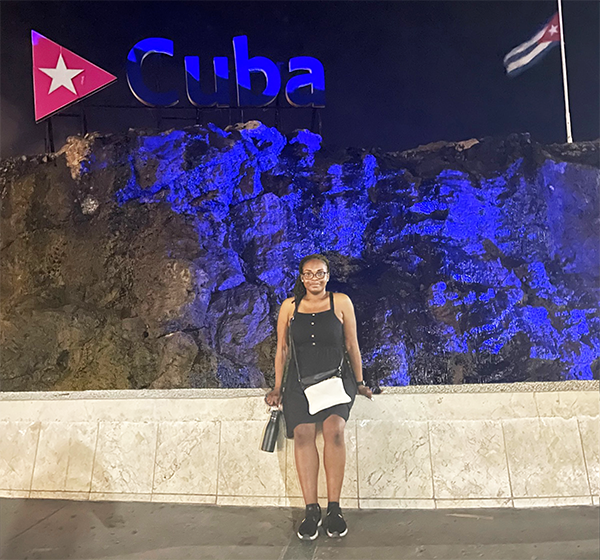by Thomas Ehlers
Lateefah Key had only been out of the country once on a vacation. Her second trip brought her a new perspective.
Key, a master’s student in the University of Georgia’s School of Social Work, enrolled in the University of Georgia’s College of Agricultural and Environmental Sciences’ Cuba: Food Security and Sustainability in an Economy in Transition Study Abroad Program in May 2022.
She and a group of students spent two weeks in Havana, Cuba, studying food security and welfare. As a social work student, she was able to take in what she experienced through a social work lens.
Key’s experience enabled her to see positives from a different healthcare system – one she described that helped people “across the board” at a low cost.
“Oftentimes the American perception of Cuba is that it isn’t as developed as other countries,” Key said. “In reality, once you observe their clinics and other medical offerings, they come from a place where prevention is emphasized over intervention. In the U.S., we tend to focus on intervention, and over there they try to attack it before it happens.”
Key gave the example that around the age of 15, Cuban girls receive a woman’s checkup where physicians check for breast cancer and other female diseases – much earlier than when women in the United States receive these measures.
She also learned the importance of entering each situation with a clean slate and not relying on a preconceived notion – such as perceptions and opinions many U.S. citizens may have on Cuba – to judge a person or situation.
“Most of the time, we usually get a report on that person stating what we should know, any important things, and you form your opinion about that person or the event before you get a chance to interact with that person, talk to that person, speak with that person, understand their experience and how they view things,” Key said. “That can be a big hindrance to providing services to populations that you are not familiar with.”
Samantha Gambuti, another master’s student who was a part of the trip, learned the importance of speaking with people to find out how policies in place are working as well as working with a lens that pushes for successful programs.
“For me, I learned to look at policies that served the people and policies that didn’t serve the people so that when I am looking at social work and social work welfare policies specifically, really examining what is serving our communities and what is not serving our communities and always making sure I am getting this information from the people, like we were in Cuba, she said. “We were talking with people one-on-one, we weren’t going to the government (for opinions).”
Susana Ferreira, a professor of agriculture and applied economics in UGA’s College of Agricultural and Environmental Sciences, served as the program’s coordinator. She led the team of students for the program’s first trip to Cuba, and she described the trip as “one of the most transformative experiences” of her life.
“We were living in the houses of Cuban people,” Ferreria said. “That’s a very important element of the program, in my opinion a crucial element. You were immersed in the day-to-day life of a Cuban family. You weren’t a fly on the wall because they had to care and provide for you.”
Students were divided into these homes, making sure a translator or Spanish-speaking student was in each home, allowing students to grow, learn and make connections with each family. She noted the transparent, open relationships between the host families and students despite the long-held tensions between the U.S. and Cuba.
“Another thing that surprised me is that people were so welcoming towards the students,” Ferreria said. “They didn’t perceive them as ‘the enemies,’ but that they also were pleading to us that the United States kind of relaxes the stronghold they have on the Cuban economy.”
Students receive credit for AAEC (ENVM) (FHCE) (AFST) (ADSC) 3911 (3 hours) or AAEC 8020 (3 hours) for the study program, and the program fulfills the experiential learning requirement for CAES Students. Applications for the May 2023 Study Abroad are open until Dec. 1, and CAES scholarship applications will be available from Dec. 1 through March 1, 2023.

